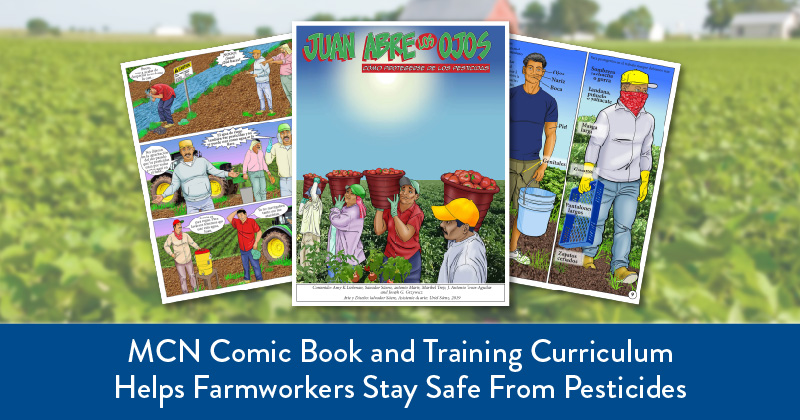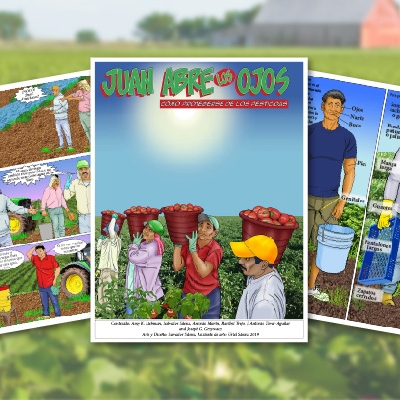MCN Comic Book and Training Curriculum Helps Farmworkers Stay Safe From Pesticides

[Editor’s Note: Another popular MCN comic book has been released! View all of MCN’s comic books, available for download for free, here. Access all the Worker Protection Standard training curricula and resources here.]
COVID-19 is hitting farms hard. While outreach teams shift to provide COVID-19 prevention and support, they also continue to support farmworkers to avoid ongoing occupational hazards. Insecticides, herbicides, fungicides, rodenticides: these are different types of pesticides that are used on farms and orchards across the US every day. Farmworkers regularly encounter pesticides, even when they are not applying the pesticides themselves. Pesticide drift from nearby fields, contact with plants, fruits, vegetables, and dirt where pesticides have been used, and contaminated water and equipment bring farmworkers into direct contact with pesticides, sometimes unknowingly, and present numerous increased health risks from acute and chronic pesticide exposure. Migrant Clinicians Network (MCN) has released a suite of materials to help farmworkers better understand their risk of exposure. These materials, developed as part of Florida State University’s Pesticide and Heat Stress Education for Latino Workers (PISCA) project with the Farmworker Association of Florida and MCN, are free for download on the MCN site.
These new materials feature a bilingual, culturally relevant curriculum for community health workers and educators to facilitate trainings with to farmworkers in an environment supportive for adult learners. Materials include a slide deck and facilitator guide in Spanish and English, a flip chart version in Spanish, and a facilitator’s guide in Spanish and English, to provide colorful, easy to understand and relevant information for farmworkers. All the materials are in line with the updated Worker Protection Standard, the Environmental Protection Agency’s regulation to protect farmworkers from pesticides and farm-related injuries. The PISCA project has also pilot tested the curriculum and materials, showing an increase in knowledge among farmworkers trained.
The accompanying Spanish-language comic book, Juan abre los ojos: Cómo protegerse de los pesticidas, is another addition to MCN’s very popular comic book series on pesticides, which use low-literacy and culturally competent presentation to share health information with farmworkers. All of MCN’s pesticide comic books, featuring design and artwork by Salvador Saenz, are available for free to download, here.
This new comic book features Juan, a farmworker who splashes his face with water from the irrigation channel at the edge of the field, much to the dismay of his farmworker companions, who recognize that the water is contaminated with pesticides. The comic book then covers how a farmworker could get exposed to pesticides, why a farmworker should avoid them, and the health effects of pesticide exposure, both acute and chronic. The comic book ends with tips to protect one’s self, including many efforts utilized in the fight against COVID-19: wearing a mask or bandana; using gloves; washing hands regularly; and removing and separating clothes and showering after work to avoid bringing contaminated clothes into the home.
“These resources were thoughtfully designed and tested with farmworker input,” said Amy K. Liebman, Director of Environmental and Occupational Health at MCN. “The PISCA project team has done an outstanding job of integrating EPA-required content with cultural appropriateness and adult learning methodologies in order to help farmworkers protect themselves and their families from pesticide exposure.”
Access all the materials on our Worker Protection Standard Training Curriculum and Resources page:
https://www.migrantclinician.org/toolsource/resource/worker-protection-standard-training-curricula-and-resources.html
These materials were funded through the Southeastern Coastal Center for Agricultural Health and Safety with support from the National Institute for Occupational Health NIOSH.
Like what you see? Amplify our collective voice with a contribution.
Got some good news to share? Contact us on our social media pages above.
Return to the main blog page or sign up for blog updates here.
- Log in to post comments

